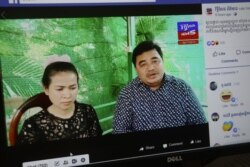A Kampong Chhnang radio station owner was convicted for incitement on Tuesday and sentenced to 20 months in prison for reporting on an ongoing land dispute between villagers and the military in the province.
Kampong Chhnang Provincial Court presiding judge Y Thavrak found Sok Oudom, owner of Rithysen radio station, guilty of “incitement to commit a felony” and sentenced him to 20 months in prison and 20 million riels, around $5,000, in punitive damages, according to Un Chanthol, a lawyer for the journalist.
The complaint was filed by Nou Samrith, deputy commander of Kampong Chhnang military operation area, for allegedly inciting villagers against the military. The journalist had broadcast a Facebook Live report on a contentious land dispute in Kampong Chhnang province’s Phnom Aural Wildlife Sanctuary, according to Sok Oudom’s wife, Nuth Sovanthou.
Un Chanthol, his lawyer, said the court should not have used the Criminal Code to jail his client, provisions in the Law on the Press could have been used to issue a correction if there was an error in the reportage.
“I think he is a journalist and his profession allows him to speak. But the court judged the opposite,” he said.
Long Sitha, Kampong Chhang court’s spokesperson, and Nou Samrith, the plaintiff, could not be reached for comment.
Oudom often posted stories on the Rithysen Radio News Station Facebook page about land disputes, clashes between people and police, and provincial court cases.
Nuth Sovanthou, 36, said her husband was among a group of journalists who were covering the land issues, but that Sok Oudom was the only one to face legal repercussions.
“It is very unfair and I don’t have any belief in the Cambodian court system,” said Nou Sovanthou, who is a mother of three.
She too questioned why the court did not use the Press Law to decide if her husband had committed a journalistic error.
“Why should we have the Law on the Press if we don’t use it to protect journalists?” she said. “He didn’t hide or incite anything.”
Article 10 of Press Law states that following a civil complaint if a court finds that the publication was false the court may order the press entity to publish a retraction, pay compensation, or publish a retraction.
Chab Sokhun, a villager from Kampong Chhnang’s Teuk Phos district, said Sok Oudom should not be accused or arrested because of his reporting since he didn’t incite people. He speculated that a mention of the provincial governor in the news report could have caused this entire episode.
“He said something affecting the provincial governor. That is why he was arrested,” said Chab Sokhun, who is involved in the land dispute.
Oudom is the third journalist in recent months to be convicted of incitement. The vaguely defined charge is often used to target detractors and critics of Hun Sen and the Cambodian government, rights groups say.
Last month, the Phnom Penh Municipal Court sentenced a Cambodian newspaper publisher who made critical comments about Prime Minister Hun Sen on Facebook to 18 months in prison. In October, Sovann Rithy, who founded social media news outlet TVFB, was convicted of incitement and given a suspended sentence.
Ith Sothoeuth, media director at the Cambodian Center for Independent Media, said the authorities should not jump to file criminal charges and instead should try to use other ways to get corrective measures.
“The [authorities] should understand the role of journalists in doing their work rather than suing them in court,” she said. “It is another threat to journalists.”
Vann Vichar, 35, a freelance journalist, said the excessive use of incitement charges was a concern, because he was never sure which story would be considered incendiary, pointing out there was little chance of getting a fair verdict in these cases.
“[Incitement charges] are a concern for me because as a journalist I do not know which article can be assessed to be incitement,” said Vann Vichar, who has worked as a journalist for some 10 years.





